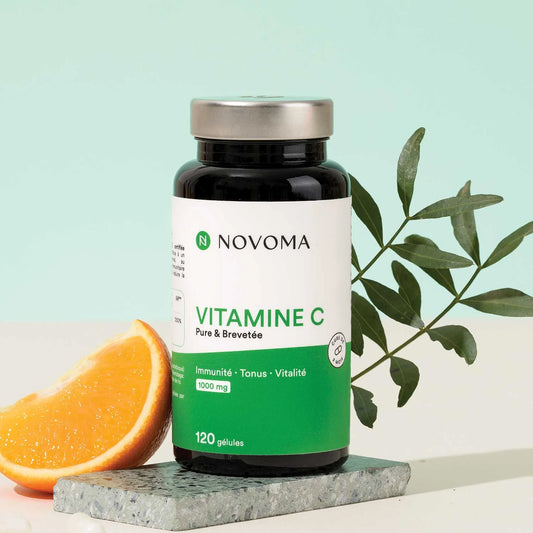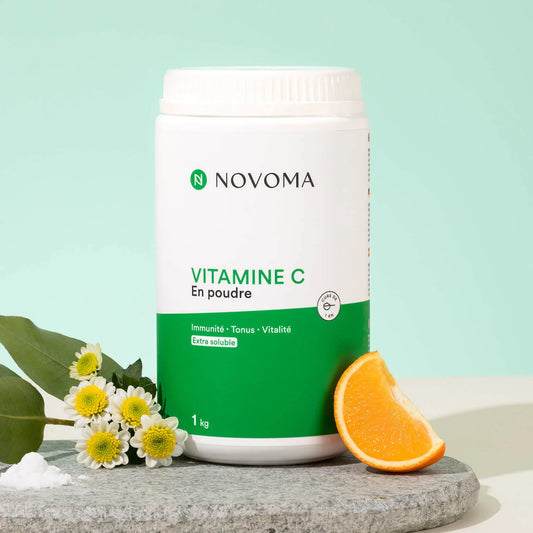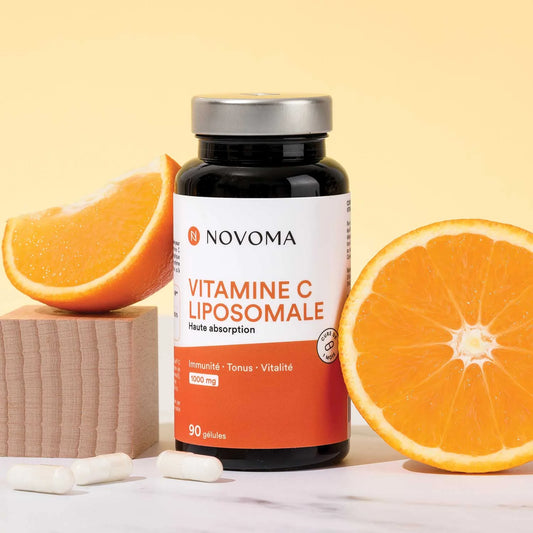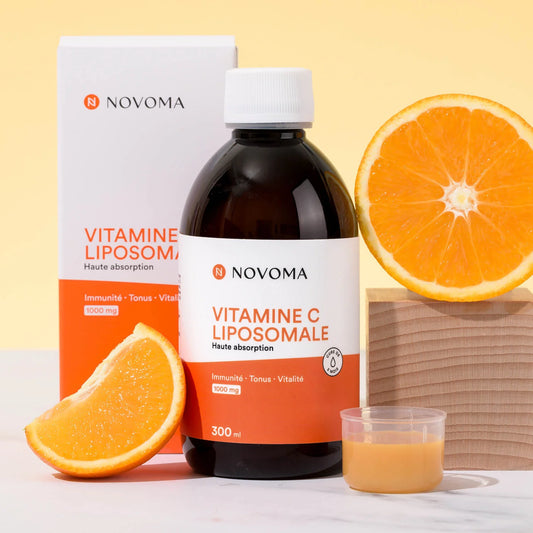
What foods are richest in vitamin C?
Summary
Touted as THE star of nutrients, vitamin C (or ascorbic acid) has numerous benefits. You're probably already aware of its role in the immune system and energy. But vitamin C doesn't stop there!
Like other vitamins, the body is unable to produce or store it. It is therefore essential to ensure its intake through food, or even to opt for supplementation in certain cases.☝️
Discover the ranking of foods richest in vitamin C , how to optimize your daily intake without any hassle and the specific cases where needs are increased.
I promise, there's no question of telling you to eat a kiwi a day all year round, just proven and concrete facts!
Why is vitamin C essential for the body?
Vitamin C isn't just a winter habit or an anti-fatigue boost. Consuming this vitamin is essential for your well-being... all year round!
Role of vitamin C: a complete nutrient par excellence
Vitamin C covers a wide range of benefits for the body:
✔️ It participates in the production of collagen :
Through its action on the production of the most abundant protein in the human body, vitamin C ensures the strength of bones, cartilage, gums, teeth and joints. By extension, vitamin C contributes to the suppleness and elasticity of the skin , and to the resistance of blood vessels!
✔️ It helps strengthen the immune system :
Vitamin C boosts the production of white blood cells, our little soldiers searching for unwanted agents to eliminate. It's also known to reduce fatigue and support our natural defenses, in all seasons! 💪
✔️ It acts as a powerful antioxidant:
Vitamin C helps neutralize free radicals responsible for premature aging and certain chronic conditions. It also ensures the regeneration of vitamin E , known for its antioxidant function and helping to reduce the oxidation of certain lipoproteins associated with cardiovascular conditions.
Be sure to check out our article on the top 10 foods rich in antioxidants ! 👈
✔️ It promotes iron absorption:
Vitamin C helps the body absorb iron , primarily non-heme iron from plants. Are you a vegetarian or vegan? Without this valuable vitamin C, you could be missing out on the benefits of the iron in your food!
✔️ It acts on the proper functioning of the nervous system
Slumping concentration? Vitamin C is a welcome addition! It contributes to normal psychological function and is involved in the synthesis of neurotransmitters such as noradrenaline, adrenaline, dopamine, and cortisol. A real plus for cognitive performance , combine with magnesium for maximum results.

What are the recommended daily intakes of vitamin C?
Recommended intakes of vitamin C depend on several factors, including age, gender, and lifestyle.
➡️ For a healthy adult, the recommended daily intake is approximately 110 mg , up to 170 mg for breastfeeding women;
➡️ Recommended vitamin C intakes range from 70 to 100 mg for adolescents and 20 to 45 mg for children depending on the age group.
However, vitamin C requirements are higher in certain situations:
Smoking: Smoking increases vitamin C requirements;
Sports activity: practicing a sport at a sustained pace increases losses (and needs!);
-
Period of stress, winter season: when the body is subjected to stress (including falling temperatures), vitamin C intake must be increased;
Exposure to pollutants.
It is all the more relevant to consume it in sufficient quantities throughout the year, so as not to lose a crumb of its benefits.
Can you store vitamin C?
For those who rely on winter detox to keep them sane for the season, bad news: vitamin C is water-soluble , which means it isn't stored by the body! Some of what you consume is eliminated every day through urine and sweat.
➡️ Regular intake is necessary to benefit from it. Like most vitamins (except vitamin K and D) , the human body cannot synthesize vitamin C.
💡 Culture update : Humans, macaques, some rodents, and most fish are unable to produce it due to a mutation in a gene responsible for its synthesis. Only diet can ensure its intake and proper assimilation.
So, do you know which foods are richest in vitamin C ?

Ranking of foods richest in vitamin C
Spinach and kiwis, the undisputed champions? There are actually other foods that can boost your intake in one bite. Here's a ranking of the foods richest in vitamin C.
The fruits richest in vitamin C
1. Acerola cherry (up to 2850 mg/100 g)
Yet another outsider that deserves its place at the top: the acerola cherry. This fruit contains 30 to 40 times more vitamin C than an orange! Enough to give you a boost in the morning. Organic Acerola is our dedicated energy supplement, and there's a reason!
We recommend you
Organic Acerola
Organic Acerola 1000, ideal during periods of intense activity to regain tone and vitality.
- ✅ 1000 mg of acerola per tablet
- ✅ Titrated to 17% natural vitamin C
- ✅ Wild berry flavor (sugar-free)
- ✅ Certified Organic by Ecocert
2. Guava (228 mg/100 g)
If you're looking for a more accessible fruit, turn to guava pulp. This exotic fruit offers an impressive dose of vitamin C.
3. Blackcurrant (181 mg/100g)
Small but mighty, blackcurrants contain a very high vitamin C content. Their tangy taste will go perfectly in a complete fruit salad.
4. Kiwi (93 mg/100 g)
Kiwi is one of the fruits richest in vitamin C. Eat two for breakfast and you're ready for the day!
5. Citrus fruits (orange, lemon, grapefruit) (approximately 50 mg/100 g)
Although often associated with vitamin C, they aren't the richest sources, but they're still an accessible and tasty source. A medium orange provides about 70 mg of vitamin C, making it a convenient option, especially as a fresh juice in the morning.
Vegetables richest in vitamin C
1. Raw red pepper (about 190 mg/100 g)
The king of vegetables rich in vitamin C is undoubtedly the red bell pepper. Just a few pieces in a salad are enough to fill up on vitamin C. Tip: If you can digest it well, choose raw, as heat quickly destroys this precious vitamin.
2. Fresh parsley (170 mg/100 g)
By adding a few sprigs of parsley to your dishes, you can enjoy its flavor and its vitamin C content. One more reason to add some to your dishes!
3. Kale and broccoli (90 to 120 mg/100 g)
Kale and broccoli are also an excellent source of vitamin C. To maximize the benefits, steam them gently.
4. Spinach and watercress (70 mg/100 g)
In addition to being iron champions, spinach and watercress are foods very rich in vitamin C. To increase the absorption of the iron they contain, add a squeeze of lemon juice.
5. Brussels sprouts (85 mg/100 g)
Not a popular dinner item, Brussels sprouts are nevertheless an excellent source of vitamin C. Not a fan of the taste? Try roasting them in the oven with olive oil and herbs; this will soften their flavor while preserving their nutrients.
6. Tomato (14 mg/100 g)
It's not the richest in vitamin C, but it has the advantage of being easy to consume in all its forms. Raw, in sauce, in salad... Tomatoes remain an ally of healthy eating.
This ranking of fruits and vegetables richest in vitamin C is taken from the nutritional tables of Ciqual , the reference food composition table in France.

Little-known superfoods rich in vitamin C
Among the less common superfoods, some win the prize for vitamin C content.
1. Myrciaria dubia (camu camu) (2400 mg/100 g)
This Amazonian fruit is the undisputed king of vitamin C sources. Camu camu (or Myrciaria dubia) boasts a concentration that surpasses all its competitors. A teaspoon of camu camu powder is enough to cover (and exceed) your daily needs. Its tangy flavor makes it ideal for adding to a smoothie or yogurt.
2. Sea buckthorn berries (450 mg/100 g)
Little known outside of nutrition enthusiasts, sea buckthorn berries are an extraordinary source of vitamin C. These small berries, native to Europe and Asia, are often sold in juice or powder form. Add some to your smoothies or cereal. 🥣
2. Baobab (250 mg/100 g)
Baobab powder is obtained from the fruit of the African tree of the same name. It is often used in superfood recipes (smoothies, chia puddings) for its energizing properties and richness in antioxidants.
How to optimize your daily vitamin C intake?
Have you spotted your favorite fruits and vegetables rich in vitamin C ? Now you need to know how to eat them without missing out on any of their benefits. Here's how.
Eating raw or undercooked foods
Ascorbic acid is a fragile vitamin and is quickly destroyed by heat. To preserve its integrity, consume foods raw or cooked at low temperatures.
For example, raw pepper strips in a salad or lightly steamed broccoli florets will retain maximum vitamin C.
Combine vitamin C with plant iron
Vitamin C is beneficial in itself, but it actually increases the absorption of iron from plant sources, particularly in people following a vegetarian or vegan diet.
✅ In practice: add a squeeze of lemon juice to your spinach, a citrus vinaigrette to your lentils, fresh parsley to your vitamin C-rich dishes. This little tip supports iron absorption!
Incorporate these foods into balanced meals
The ideal way to get all the vitamin C you need is to spread these foods out throughout the day and week. An orange and acerola juice in the morning, a spinach and lentil salad at lunchtime, a broccoli pad thai in the evening... and you've got a guaranteed vitamin C-rich day!
💡Minute culture: where does the frantic race for vitamin C come from?
Discovered in 1912 and isolated in 1928 by physiologist Albert Szent-Györgyi, it helped solve a historic disease: scurvy. Contrary to popular belief, the "sea plague" does not date back to the era of caravels. It was already prevalent in ancient times during extreme famines.
After centuries of natural lemon-based aids, the discovery of ascorbic acid and its lack of toxicity was the starting point for its meteoric rise in the pharmaceutical and food industry (as a preservative) . A rise supported by the chemist Linus Pauling who advocated the administration of mega-doses of vitamin C as a miracle cure for many ailments !
Although scurvy is rarer today, vitamin C deficiency affects nearly 9.2% of French people . Aside from cases of malnutrition and precarious socio-economic conditions, the vitamin deficiency observed in fruits and vegetables over the past fifty years is one of the reasons why vitamin intake must be monitored!
We recommend you
Vitamin C Powder
Pure vitamin C in extra-soluble powder of plant origin (100% L-ascorbic acid).
- ✅ Available in 2 sizes (500g/1kg)
- ✅ Purity > 99.9%
- ✅ Measuring spoon included
- ✅ Packaged in France
When should you consider vitamin C supplementation?
Certain situations require increased vitamin C needs, and supplementation may be appropriate.👇
When can diet alone be insufficient?
Some people may struggle to meet their vitamin C needs through diet alone:
➡️ People recovering from illness whose immune defenses have been weakened;
➡️ Pregnancy and breastfeeding period;
➡️ Individuals suffering from malnutrition;
➡️ Smokers have increased losses of vitamin C, and 30% higher needs;
➡️ Athletes practicing endurance sports: Intense physical exercise causes increased production of free radicals and a greater demand for antioxidants such as vitamin C. Their needs rise to 1000 mg per day !
Why choose Novoma Vitamin C and how to take it?
A good supplement isn't just a matter of dosage. And as you know, at Novoma, we don't do things by halves!
Our Quali®-C Vitamin C has been formulated to support your immune system, maintain your vitality and contribute to healthy collagen synthesis:
✅ Highly bioavailable form for optimal assimilation:
Our vitamin C comes from the Quali®-C label, the only vitamin C produced and certified in Europe, specifically in Scotland. This label is renowned for the high purity of this plant-based vitamin C, obtained from corn. Its dextrorotatory L(+) Ascorbic Acid form is the same as that found in food.
✅ Guaranteed without additives and excipients:
It's made in France, guaranteed GMO-free, nanoparticle-free, and suitable for vegetarians and vegans. Clean, effective, and without the frills! 😎

✅ Ideal as a treatment to boost immunity and reduce fatigue:
A course of treatment lasting a few weeks (especially in winter) can boost your immunity and prevent signs of fatigue. For those with increased needs, it may be possible to repeat the course.
Our advice: consider combining vitamin C and spirulina to maximize iron absorption.
✅ A form and dosage adapted to needs :
The capsule format is convenient and easy to consume, and each daily dose (2 capsules) contains an optimal dose of 1000 mg. For children aged 4 to 10 years, 1 capsule per day is sufficient.
As for the question “ when to consume vitamin C ?”
👉 In reality, the time of day you take it doesn't matter. Some people choose to take it in the morning for its energizing effect, while others opt for it in the evening to support their immune system before going to sleep.
Vitamin C isn't just a winter boost. Whether it's to strengthen your immune system , improve your skin condition, or promote iron absorption, it's a must-have. Consider varying your sources among the foods richest in vitamin C, and opt for a supplement if your needs increase!






























